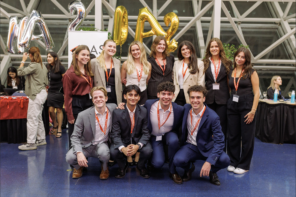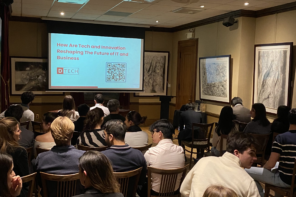A winning team, a disgruntled grad student, his angry father, and a million-dollar solution for world hunger
At the end of September, shortly after McGill’s Hult business team won $1 million for their business proposal at the Hult Business Competition, a wave of articles detailing the story of Jakub Dzamba were published. Dzamba is a PhD student in Architecture at McGill, who accused the Hult team of plagiarism regarding their winning presentation at the Clinton Global Initiative.
I noticed, however, that all articles on the subject focused on one side or the other: either the Hult team’s win or Jakub’s allegations against the team. Interested in listening to both sides of the story, especially after having interviewed the Hult team back in March, I set up interviews with both the Hult team and Dzamba.
On Wednesday, October 9, I interviewed the Hult business team. They had much to say about their win, their project, and their future plans, but were not interested in discussing the Dzamba issue. Team member Jesse Pearlstein responded that they were not at liberty to speak about the controversy with Dzamba, but that “mediations are being conducted with the McGill faculty, and both parties are cooperating.”
I first spoke to Jakub Dzamba two days later, and he was very willing to speak about the controversy. He described how he became involved with the team back in February 2013, when two team members approached him inquiring about his designs for the cricket farms. “In the end, what I contributed was about 50% of the graphic design for the presentation,” he claimed. “[I also contributed] some strategy and coaching for the presentation.”
Dzamba maintains that the team made an informal agreement to make him a member of the team if they won at the Boston Regional Final. However, the Hult Rules only allow for a maximum of five people per team, and the team already consisted of five members. After the Hult team’s win at the Regional Final, Hult judges refused to let Dzamba join the team. “I expected that [beforehand], and I brought that up,” Dzamba noted. ”They said if it did not work they would find another way.” Afterward, according to Dzamba, the Hult team ignored him and then took credit for the graphic designs he had made for the team’s presentation at the Regional Final Competition.
The Bull & Bear spoke with the McGill Hult team in March, following their win at the Boston Regional Final Competition. During the interview, the team disagreed over whether they should refer to Jakub Dzamba as a “partner” or a “collaborator”– and this debate continues today. For how much of the winning presentation should Dzamba be given credit?
According to a resolution proposed by McGill administrative staff in August, “Mr. Dzamba made a substantive contribution to the Hult Prize Regional Final presentation that warrants recognition.” In addition, “Mr. Dzamba originally filed a Report of Invention in August 2012, long before the McGill Hult Prize Team contacted him for consultation… Mr. Dzamba played a leading role in the invention of the cricket farming device in question. To date, there is no evidence that any of the Hult Prize Team’s contributions to the device rose to the level of status as a co-inventor for the patent.”
However, the resolution makes no mention of the team’s Final Presentation at the Clinton Global Initiative. According to the team, none of Dzamba’s designs or graphics appeared on the winning presentation. They insists that the presentation was based on internal research done by the team over the summer, after the team severed ties with Dzamba.
After performing on-the-ground research in Thailand, Mexico, and Kenya, the team shifted away from Dzamba’s small-scale cricket farm and toward cricket farming on a larger scale in rural areas. Shobita Soor, a member of the team, explained that people in the urban slums are not interested in farming, and would rather buy crickets in the marketplace. While it can be agreed that Dzamba contributed to the presentation at the Boston Regional Competition, it is unclear how much of the Final presentation can be attributed to Dzamba’s research.
Thursday night, I received an anonymous email informing me that “despite Jakub Dzamba’s best efforts to convince him not to, his dad has come to Montreal to protest the Hult issue.” The email said he would be protesting outside the Bronfman Building throughout the night.
I spoke briefly with the elder Mr. Dzamba, who expressed regret toward the lack of acknowledgement of his son’s research. He stated: “I raised [Dzamba] to understand that academic integrity and research integrity are untouchable.” He accused McGill of turning a blind eye to the violation of Dzamba’s intellectual property rights.
Although the school has been accused of encouraging unethical behavior in its students following this controversy, McGill is not obligated to mediate the issue due to its existence outside of the academic classroom. Ultimately, it is up to Dzamba and the Hult team to reach an agreement on their own, as the University cannot be held responsible for presenting a resolution agreeable to both parties.
Mr. Dzamba had no further comment on the controversy, but suggested that I research both his son’s presentation at the Dobson Cup and the McGill team’s final presentation. I was unable to locate the documents, despite intensive efforts. Further research concluded that the documents have been taken offline while mediations between the McGill team and Dzamba continue. Later, I looked into the email address from which I received the tip. I found it was connected to a Facebook page of a local Montreal graphic design company. The page included images of Dzamba and his wife.
Biking home from campus after speaking with Dzamba, a member of the Hult team was biking just a bit ahead of me. I have interviewed the team twice now, and considered us to be on “speaking terms.” When I tried to approach the team member on my bike, he sped up significantly. He began to run red lights and stop signs, checking behind himself constantly. Perhaps he did not recognize me, but I felt both slighted and nervous at this response to my presence.
As students, we are constantly warned about the “evils” of plagiarism, but what about the protection of our own intellectual property? In the case of a student stealing from another, how far can the University go to protect its those involved? And what if it is in the best interests of the University to protect one student over another? The Hult team has brought a lot of positive public attention to McGill. The University could damage its reputation by admitting that its prize-winning team won because of the research and efforts of another student.
On Friday, I attended a conference for the Social Economic Initiative. As I approached the building, I found Mr. Dzamba still protesting. He had been joined by a younger woman, who I recognized as Jakub Dzamba’s wife from my previous investigation into the anonymous email I had been sent. I introduced myself, and attempted to inquire subtly about whether she had sent me an email. She did not know anything about the email and seemed rather taken aback. I excused myself and went inside. Now even more curious about the person who supplied the anonymous tip, I emailed the address asking if the person was a friend of Dzamba’s, and if he or she would like to make a comment on the Hult controversy. The email went unanswered.
At the SEI Conference, two members of the Hult team presented their winning pitch. Bill Clinton described Aspire as a “tangible, substantial solution” to the problem of food insecurity. The solution is beyond the scope of Dzamba’s cricket farming technology. The proposal is extraordinary for the way that it uses available technologies, while adapting itself for the cultures of its target populations. It address the problems of malnutrition and food insecurity in these areas.
This brings me to the final question raised by the controversy surrounding Hult– what if the project is in the interest of social good? If a business has the potential to save millions of lives, does it justify unethical behavior in other veins? I do not pretend to have an answer to this question, but I do think it raises interesting ethical dilemmas. In fact, when asked how the team felt about others “copying” their idea of cricket farming, Hult team member Zev Thompson commented that the team would welcome competition in their business: “it would be better for the world, because it would mean that people were eating much more efficiently farmed food, which is really [the] overarching mission of Aspire.”
In the process of investigating Hult, I have stumbled across more questions than answers. Both Dzamba and the members of Aspire Food Group are brilliant, enthusiastic social entrepreneurs with the potential to bring positive change to the world. Hopefully, soon, they will be able to focus on just that.







